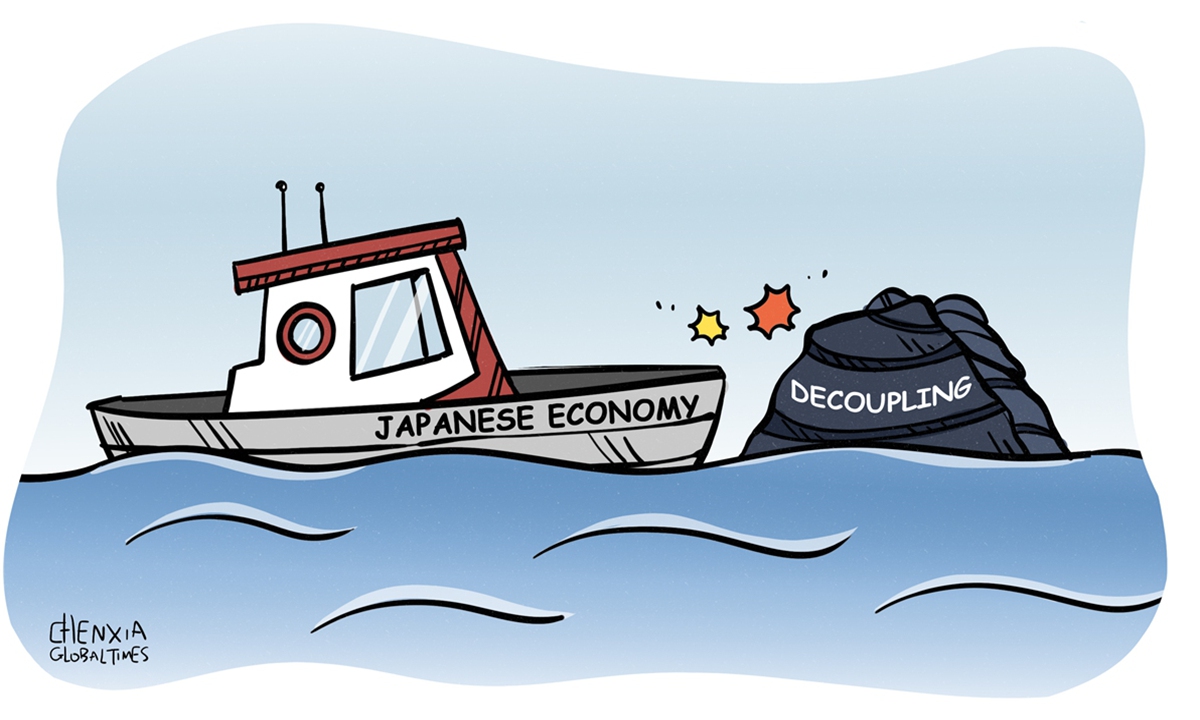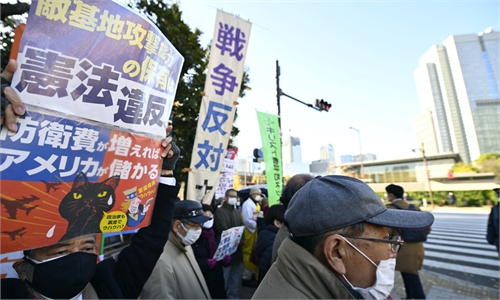Forging an ‘Economic Iron Curtain’? Japan better not be confused again: Global Times editorial

Illustration: Chen Xia/Global Times
On Thursday, Japanese Minister of Economy, Trade and Industry Yasutoshi Nishimura met with US Secretary of Commerce Gina Raimondo in Washington. The two reached consensus on strengthening cooperation on economic security, in other words, strengthening export restrictions on China and Russia in critical technologies such as semiconductors, biotechnology and artificial intelligence, ganging up to promote decoupling and breaking supply and industrial chains. Whatever excuse they use, this is a step backward in the global history of free trade.
The US and Japan have cloned their military alliance in the field of economy and trade. Japan, which sees trade as fundamental in its national development strategy, should think carefully.
After the talks, Nishimura delivered a speech at the US think tank Center of Strategic and International Studies (CSIS). He said that democratic powers had made a mistake more than two decades ago in assuming that deepening economic interdependence by bringing China and then Russia into the World Trade Organization would "unquestionably bring about a peaceful world." Rather than helping to build peace through prosperity, it only ended up increasing the geopolitical risks, Nishimura said. Authoritarian governments used economic growth and technological advancement to boost their power.
It makes people feel uncomfortable to hear this superficial point of view, which has been circulating in Western "civil science" circles, and is now solemnly expressed by Japan's trade and industry minister. It is not surprising for the heads of Western countries' security departments, who see exaggerating "threats" as their responsibility, to say so. But this is 2023. It is a mystic regression that a major trading power's trade and industry minister's understanding of global free trade remains at the level of when the "Iron Curtain" speech was delivered. His logic involves forging a new iron curtain of economics and trade in the world. They did not make a mistake more than 20 years ago. They are making a huge historical mistake today. They are splitting and dividing this world, which was only able to reach its current closely connected status thanks to economic globalization.
To be honest, Japan is sometimes hard to understand. China has been Japan's largest trading partner for 15 consecutive years, and trade with China accounts for more than 20 percent of Japan's foreign trade. This is not a question of whether some politicians like it or not, but about the vital interests of a large number of Japanese people.
Therefore, it is normal for Japan to feel trapped in a dilemma when Washington puts pressure on the country to cooperate in the containment and suppression of China, and Japan is relatively restrained on some issues. However, on other issues, Japan can suddenly act proactively, and even more radically than Washington. This immaturity and instability in national strategy makes it difficult for Japan to achieve the goal of becoming a "political power" it has been striving for, and it also makes neighboring countries worry.
The US strategy toward China has become an overt conspiracy. It is committed to weaving an external network that blocks and restricts China's development. It starts with the alliance system, in which Japan plays an important part, but it is fundamentally being used as a tool. Of course, Japan has its own calculations between China and the US, and in fact it has a certain space to use its own initiative.
Japan needs to take a long-term view and not abandon its efforts to engage in friendly cooperation with China, let alone push the bilateral relationship in the direction of confrontation. It should not get into a blind alley when looking at China's development. From another perspective, China's development is not a source of pressure, but an opportunity for Japan.
Whether it is Japan or the US, no one can stop China from developing. A stronger China hopes to engage with other countries in a peaceful and friendly way, which will bring more opportunities for mutually beneficial cooperation. Now, some Japanese people are frightened that if China becomes more powerful, it will teach Japan a lesson, so they want to block and destroy China's development. This is a misjudgment that could have serious consequences, which is especially worthy of vigilance in Japanese society if it wishes to avoid the worst case scenario of a self-fulfilling prophecy.
It cannot be denied that some manipulations by the US have continuously released disruptive signals, causing chaos in China's development and global trade. But the real impact is far less than the superficial bluff they have created. Actions that violate economic laws and market principles are unsustainable, no matter how hard they are pushed. Japanese Prime Minister Fumio Kishida will visit the US on January 13 to meet with US President Joe Biden. We hope that Biden and Kishida's vision can surpass the level shown during Thursday's ministerial meeting.

